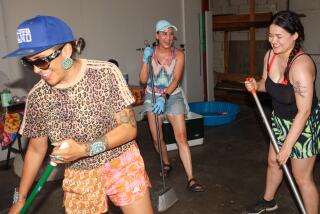Indians Pull Up Scholarly Chair at UC Riverside
- Share via
RIVERSIDE — A prominent American Indian activist couple have established the first chair for American Indian studies in the University of California system at UC Riverside.
Rupert Costo, 80, a full-blooded Cahuilla Indian, and his wife, Jeannette Henry, 77, a Cherokee, said they chose the Riverside campus as home for the unique scholar’s chair in American Indian affairs because the nearly three dozen tribes in Southern California make it one of the most culturally rich and diverse Indian areas in the United States.
University officials believe the chair is one of only a handful like it in the nation.
Only 2 Others
“We have researched this,” said Jack Chappell, spokesman for the university, “and to our knowledge there are only two other chairs in the country established in Indian affairs.”
The outspoken Costos raised the $400,000 that constitutes the bulk of the endowment by selling a three-story mansion they owned in San Francisco’s Haight-Ashbury district that for two decades served as headquarters for the American Indian Historical Society. They negotiated for more than four years before they persuaded university officials to accept some unusual qualifications.
Notably, while most chairs in the UC system have appointments ranging from three years to life, a scholar may hold the Rupert Costo Chair for no longer than two consecutive years.
“We wanted it that way,” said Jeannette Costo, “so that, if we had to, we could get rid of a real bummer scholar--a guy who turns out to be anti-Indian or a despot.”
“It is a way of weeding them out if they don’t come through,” added Rupert Costo.
If it is anything, the Rupert Costo chair is flexible. Unlike most chairs, which call for specific academic backgrounds, it is open to scholars with a variety of interests. “An historian doesn’t necessarily have to fill this chair,” said Carlos Cortes, chairman of the university’s history department. “It could be a musicologist, an anthropologist, a political scientist or folklorist.”
Carlton Bovell, a biology professor and former vice chancellor at the Riverside campus who worked closely with the Costos in setting up the chair, expects the new scholar’s position to attract more American Indian students to the university.
“It carries a strong message to native Americans as a minority that has suffered segregation, discrimination and callous treatment by the majority,” he said.
Gay Englezof, coordinator of gifts and endowments for the UC system, said the chair position represents “a big step forward for the university.” She also said the “out-of-the-ordinary” chair will enhance the university’s ability to attract additional research funds and scholars from across the nation.
Separately, the American Indian Historical Society, which was founded by the Costos in 1950 to promote and develop the culture, education and general welfare of American Indians, has donated its library of 15,000 books, treaties, legal documents, prints and paintings to the Riverside campus. The society now operates out of the Costos’ nearby home, Jeannette Costo said.
“What makes the collection particularly unique,” said John Tanno, acting librarian, “are the legal documents that are in it. The files of correspondence among tribes are priceless.”
Mrs. Costo said the collection, which will be housed in the new Rupert Costo Library of the American Indian at UC Riverside, will be “blessed” during a May 9 dedication ceremony by “six direct descendants of the Cheyenne, who, with the Sioux, beat the hell out of George Custer.”
In a sense, the collection of books and legal documents is a reflection of the people who put it together.
Rupert Costo was raised on a reservation near Hemet and has worked as an engineer, hydrologist, meteorologist, surveyor and lobbyist for Indian affairs in Washington, among other things.
American Indian Quarterly
Jeannette Costo said she ran away from home at age 17 and became a police reporter for the Detroit Free Press in the late 1930s. Later, she wrote for numerous small publications.
Together, the couple have published a scholarly American Indian quarterly, the only national Indian newspaper, a magazine for Indian children and books by Indian authors--including some they wrote together. They now are collaborating on a book about the history of the Cahuilla.
The Costos regard their work as far from over.
“We’ll continue to write articles and books that correct misconceptions about American Indians,” Rupert Costo said.
“We’ve never failed at anything,” added Jeannette Costo.
More to Read
Sign up for Essential California
The most important California stories and recommendations in your inbox every morning.
You may occasionally receive promotional content from the Los Angeles Times.














